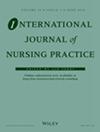Psychometric Testing of the Cross-Culturally Adapted Thai Version of the Caregiver Self-Efficacy in Contributing to Patient Self-Care Scale in Caregivers of Patients With Chronic Illnesses
Abstract
Aim
To evaluate the psychometric properties of the Caregiver Self-Efficacy in Contributing to Patient Self-Care Scale (CSE-CSC).
Background
The CSE-CSC scale was developed congruently with the Caregiver Contribution to Self-Care of Patient with Chronic Illness Inventory (CC-SC-CII) to assess caregiver self-efficacy (CSE), the motivation factor of caregiving. Its applicability in Asian populations, including Thailand, was limited.
Methods
Psychometric tests were guided by COnsensus-based Standards for the selection of health Measurement INstruments (COSMIN) principles. This included translating the English version into Thai, following the principles of good practice for the translation and cultural adaptation process for patient-reported outcome (PRO) measures. Nine nursing experts evaluated the content validity. The analysis included caregivers of patients with chronic conditions from 16 primary care centres in Thailand. We tested the structural validity using exploratory factor analysis (EFA), confirmatory factor analysis (CFA) and concurrent validity for CC-SC-CII-v2. We tested the scale's reliability with methods for multidimensional and unidimensional constructs, the intraclass correlation coefficients (ICCs) and measurement error variance.
Results
Kappa coefficient (k = 1.00) indicated the scale's excellent content validity. The final analysis included a total of 407 samples. The EFA with the first split-half subsample (n = 194) extracted a two-dimensional structure. One reflected CSE in Maintenance and Monitoring behaviour and another captured CSE in Management behaviour. CFA with the second split-half subsample (n = 213) and the overall sample (n = 407) supported the scale's bidimensional model with high factor loadings. Each dimension and the overall CSE-CSC scale positively correlated with each scale and the overall CC-SC-CII-v2. McDonald's ω and Cronbach's α (both ranged from 0.91–0.94) indicated excellent internal reliability. Test–retest reliability showed ICCs between 0.95 and 0.96. Measurement error yielded satisfactory results.
Conclusion
Testing of the Thai CSE-CSC scale supported validity and reliability, indicating that the scale can apply to Thai caregivers. This scale can be used in clinical practice and research to evaluate CSE in contribution to patient self-care.

 求助内容:
求助内容: 应助结果提醒方式:
应助结果提醒方式:


